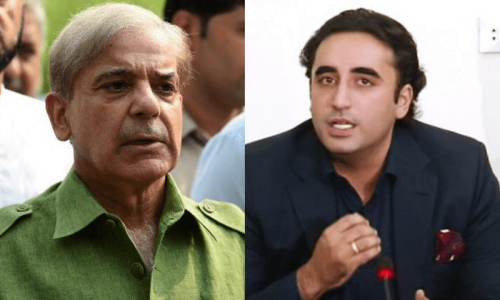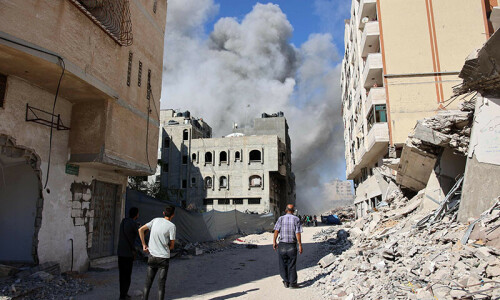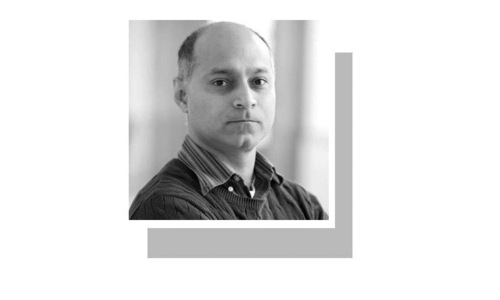Elections 2008 may be the most unpredictable polls ever held in this country. And yet they may also be the most easy to assess, depending on how you see them.
What makes them difficult to predict are the countless imponderables? Nobody really knows how much this country has changed in the last few years; or in just a few days after Benazir Bhutto’s assassination.
We don’t know how exactly has the 24/7 bombardment of views by electronic media impacted the public; how the ‘parha likha Punjab’ campaign of today is being compared with ‘yellow cab scheme’ of yesteryear; how have the war on terrorism and the almost daily bomb explosions affected the local sentiments and, above all, the ever-rising prices of food items, gas and electricity, if you get them at all.
The elections may not be as difficult to assess as they are generally being made out to be, particularly if one goes by the traditional basis of clans (biradri), political groupings and personal clout. The coming elections, say most analysts, are just about the battle for Punjab as trends -- particularly in Sindh, Balochistan and the NWFP -- are easily discernable.
In Sindh, after the murder of Benazir Bhutto, the PPP is seemingly sweeping rural areas and the MQM, at a minimum, seems to be retaining its electoral strength in urban areas. Published reports give the PPP 40 and MQM 16 directly elected national seats with a margin of plus or minus three seats. Balochistan presents, like always, the picture of a divided house where all the three mainstream parties -- PPP, PML-N and PML-Q -- are in a possible position to grab three seats each with a margin of plus or minus two seats. The boycott by the Baloch and Pakhtun (PMAP) nationalists may have increased the prospects of MMA to five seats, despite divisions in its ranks, with a margin of plus or minus two.
The NWFP, say most surveys, shows the MMA climbing down sharply from its highest-ever tally of 28 seats in the last elections. Jamaat-i-Islami is now canvassing openly against the larger JUI wing of the MMA coalition which, according to a published survey, may get only three seats this time around. The polls in the Frontier are all about whether the PPP or the ANP, both of which could not grab a single seat last time, fills the vacuum that might be left by the MMA. Surveys predict both parties bagging 12 directly elected seats out of total 35 with a margin of three plus or minus seats. That leaves us to the province that matters -- the Punjab that houses 148 of the 272 directly elected seats.
Interestingly, all the three major parties – PML-Q, PML-N and the PPP -- claim that they will bag 115 seats each. This may be the height of overstatement, if not outright hilarious. Their bravado does not match the figures. Consider this:The PML-Q, as confirmed by its website, has awarded tickets to 139 members only. The figure of 115 directly elected winners is numerically not possible as over 25 winners of the last assembly have either refused party tickets or the party has not accepted their candidature. The list includes former federal ministers like Hina Rabbani Khar, Jahangir Tareen, Amin Aslam and Tahir Javed (and members like Sanaullah Mastikhel, Saeed Aakbar Niwani, Akhtar Kanju, Major Tanvir, Hamid Nawaz, Ali Hassan Gilani, Rashid Akbar, Faiz Tamman, Rana Nazir, Amanat Shadikhel, Ejaz Ahmad, Farooq Azam, Amir Yar Waran, Asad Murtaza Gilani).
Out of the 114 candidates, PML-Q may actually have the numerical possibility of sharing with the PPP and the PML-N in the Punjab just 95 seats. PML-Q will not have eight of its members available in the upcoming assembly even if all its candidates contesting on multiple seats win (Pervaiz Elahi is contesting on three national seats, Shujaat on two, Hamayun Akhtar on two, Chaudhry Shahbaz on two, Sheikh Rashid on two and Tariq Banday whose death has caused postponement of elections on two seats). One also needs to take into account smaller parties (like PML Functional’s three possible seats in Rahimyar Khan) and a possible figure of 10 independents.
With nominal electoral prospects in smaller provinces, the PML-Q has, numerically, a difficult job to make it to the magical number of 172 required to make its own prime minister.
The task becomes even more difficult if one considers another 10 seats where the party leadership is involved in a war of sorts against its own candidates. The party is openly supporting independents against their party ticket holders (like Tariq Anees against Daniyal in Shakargarh, Nasruallah Dreshik against Jafar Leghari in D.G. Khan, Umair Rokri against Sher Afgan) or have local nazims working against them.
One can safely identify another two trends in the battle for the Punjab. The winds in the Punjab urban, like even in the 2002 elections, are not blowing the PML-Q way. PML-N is all set to dominate the cities with its leadership hoping to bag at least nine seats in Lahore, another six in Faisalabad and, who knows, the mother of all victories in the shape of Sheikh Rashid’s two seats in Rawalpindi. The PPP, say the published reports, seems like a close second in Punjab cities comprising almost half of the total seats.
A similar wave is visible in the Saraiki belt that constitutes about 53 seats. They have amongst their rivals all the notable families of the Saraiki land -- the Nawabs of Bahawalpur, the Makhdooms of Rahimyar Khan and the Syeds of Khaniwal and the Gillani-Qureshi combine in Multan. Five of PML-Q’s former MNAs are now on PML-N tickets, two on PPP, another two on PML (Functional), and yet another 10 contesting as independents.
Forget about the impact of the PML-Q victory in Punjab on the federation, the fortress Punjab seems in a rebellious mood. In comparison, both the PPP and the PML-N are better placed even if they manage to win roughly 50 seats with plus or minus five seats.
The PPP is the only party that is likely to win a sizeable chunk of seats in each province. Benazir Bhutto seems to be the proverbial ‘charon subon ki zanjeer’ even in her death. It may be the only party that has the capacity to make a government on its own. PPP’s possible 108 seats (40 Sindh, 15 Frontier, 3 Balochistan and 50 Punjab) can attract allies in ANP in the Frontier, PML-N in the Punjab and Balochistan and even MQM in Sindh, not to forget smaller parties and Fata and independents. The biggest PPP advantage is that it has the possibility of offering power-sharing in every province.
Many believe that the real reason behind Pervaiz Elahi’s bravado is not the premiership but the all powerful chief ministership of the Punjab. So please watch out for provincial seats in the Punjab. Now, this is what will also attract Shahbaz Sharif, once he gets elected in due time.Nawaz Sharif’s PML-N, in the worse case scenario, is likely to play the role of a king-maker. In a triangular fight, the PPP and PML-N seems like a sure bet this time around. The perfect scenario for the PML-N would be to have a government of national consensus in the Centre and the chief ministership of the Punjab. Similar deals could be struck out with the ANP in the NWFP and, why not, MQM in Sindh.
But this simplistic version of possible scenarios is what makes it so difficult. The coming elections may mean different things to different people. For Benazir it might just be her “revenge through democracy”; for Nawaz Sharif a vindication of his stance; for the Chaudhrys a question of their survival. For judges it might bring in a possibility of their reinstatement, freedom for the media, social change and justice for the civil society. And for ordinary people -- well -- may be a hope for changing their lot.
The question is: What will it mean for President Musharraf. What will be his options if the PML-Q gets routed in the coming elections.











































Dear visitor, the comments section is undergoing an overhaul and will return soon.